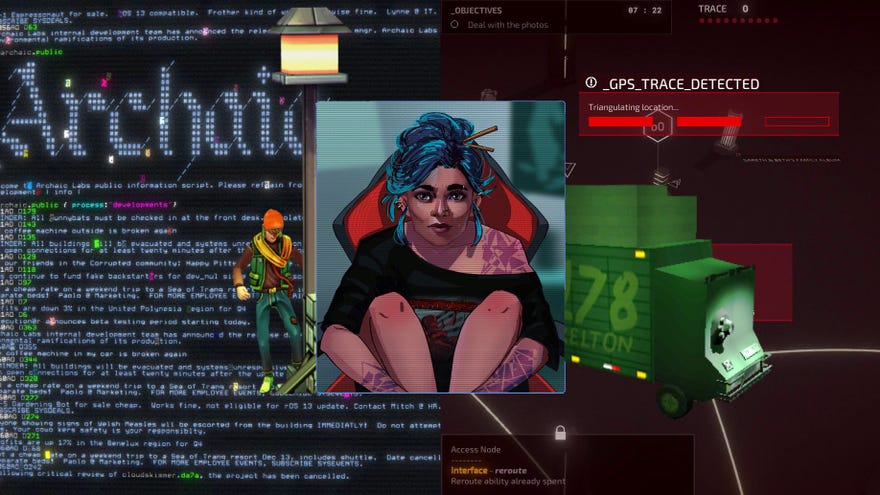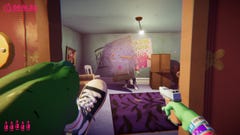The 15 best hacking games on PC
Stick a PIN in it
Who among us hasn't wished to be a cool hacker from the movies, like Hugh Jackman in Swordfish (a classic)? In real life hacking things is apparently quite dangerous and hard, but in video games we can crack the system and mutter "I'm in" under our breath as often as we want. Naturally, there have been some fabulous hacking games on PC over the years, and we've collected what we think are the cream of the crop of the best hacking games to play on PC right now.
As with our other best of lists, we take a broad view, and there are a view games on here that give an appropriate hacking vibe more than they'll have you typing commands furiously to break into the CIA's secret email account. There are others where you are hacking, but it takes a different form to what you might expect. Whatever the case, they're good fun games and they'll give you some anti-establishment fun no matter what speed of mood you're in. We'll update this list again soon, though, and there are more fun hacking games on the horizon, with titles like Mindhack taking the fight to our brains, and Vice NDRCVR going retro.
The best hacking games on PC
- Watch Dogs: Legion
- Ctrl Alt Ego
- Hypnospace Outlaw
- Minecraft
- Song Of Farca
- Exapunks
- Gunpoint
- Midnight Protocol
- Hackmud
- Shenzhen I/O
- Quadrilateral Cowboy
- Duskers
- Uplink
- Hacknet
- else Heart.Break()
15. Watch Dogs Legion
It's arguable that no game has yet taken "hack the planet" to the lengths that Ubisoft's hacktion adventure series has, and in Watch Dogs: Legion you can hack more things than ever before. Set in a grim near-future dystopia London, where the state has been partly co-opted by a private military security firm, you play as, well, anyone you want. Any of the NPCs can be brought into the Legion hacktivist fold, and they have special skills that make them more or less useful to the cause. Some are bare-knuckle specialists, others can disguise themselves, and yet more have extra hacking powers.
But everyone in Legion can remote control cars as they pass to smash them into the cyber-cops chasing them, or raise bollards in the middle of the street, or take a sneak peak at the personal data of anyone near them. And while the hacking devolves into slightly messy combat quite often, there's a lot of satisfaction in keeping it on the hacky downlow. The very best bits in Legion are when you use a little drone spider to crawl through some vents and steal all the info you need without anyone noticing, or zoom through a network of security cameras to pinpoint where the baddies are. And then you can float away on the nearest delivery drone without anyone being the wiser.
14. Ctrl Alt Ego

Ctrl Alt Ego came out in summer 2022, and it's maybe a bit of a cheat putting it on this list - it's a first-person immersive sim with a very open approach to how you can solve puzzles. But the framing for Ctrl Alt Ego is you being a disembodied self taking control of various different computer controlled devices, which is well hackery. You can hop into a little robot to pootle around rooms, jump into computer modules with cameras, open doors, control lifts, disintegrate and reintegrate other robots to teleport them into better positions. What you can take control of is governed by how much ego you have - a printer might require 8 ego to hop into and use, for example - and you can collect it by hacking into other things. The game gives you minimal direction, so exploration and experimentation are key to solving puzzles.
There are hostile robots and security cameras to contend with, but if you're a clever little floating consciousness you can avoid them by hacking into and controlling the right things in sequence. And even if you fall foul of a big nasty, you kind of can't die. If one host is destroyed, you can keep jumping to other hosts. It's an original, weird, and smart game that technically qualifies as hacking. So there.
13. Hypnospace Outlaw

In Hypnospace Outlaw you actually work for the man, navigating through a 90s webspace and censoring any bad or disallowed content with your digital banhammer. But not many games have come this close to capturing the vibe of what it was like being on the 'net in that era, before the consolidation of webspace into slick juggernaut website. Back when everyone had their own strange blog with flashing gifs of donuts and links to their weirdo metal band side project. The bar to making a working website was so low that people cobbled together some of the most magnificent junk, and Hypnospace Outlaw distils that into a tangled network of weirdos posting and interposting and having a hell of a time of it. Finding your way through it all, discovering clues that lead to unlisted blogs and hidden posters, is a kind of hacking in spirit, if not in literal form. And even if you're not breaking through firewalls, the hacker vibes, the aforementioned Swordfish of it all, are unmatched.
Disclosure: RPS contributor Xalavier Nelson Jr. was narrative designer on Hypnospace Outlaw.
12. Minecraft

I'm sorry. I tried to think of a good reason not to include Minecraft on the list. It's a survival game. It's about punching trees. It has infected millions of innocent children. But the more I tried the harder it became to disregard all the tinkering, toying and creativity that has gone into Mojang's indie luvvie-turned-superstar. First, people started making 16-bit computers inside the game, then they made music box landscapes that could play whole songs, then they made older Notch games inside the game, then they made WHOLE DESKTOPS with functioning keyboards. Then they made hard drives to save all their hard work to, and then, because you need a place to put all these machines, they made the entirety of Denmark. Even RPS got in on the action, with RPS contributor and living Intelligence Quotient Duncan Geere giving readers a running lesson in code using the game as a teaching tool.
I can understand if some people believe Minecraft is less a hacking or programming game and more of a game for hackers and programmers. But it's clear from the above examples that the latter is good enough for the purposes of this list.
11. Song Of Farca
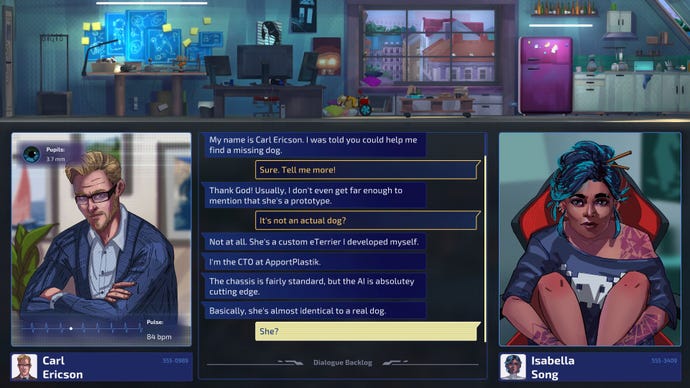
What does one do if one is under house arrest for being a hacker? Why, do more hacking, of course! Isabella Song may be confined to her studio flat, but on the internet she can go anywhere, and in the process tangles with some top crims. The story plays out sort of like a police procedural by way of Black Mirror. You take on a new case, interview the client, and run searches on everyone and thing involved. From there you hack into the security cameras at locations pertinent to the case, moving between them, triggering other automated systems and dipping into phones and PCs to find whatever clues you can, without getting caught. It plays out as a top down, stripped back representation of a place, where people are little moving dots. Meanwhile, Isabella is still sat at her desk in the top third of the screen, emphasising that you are in fact an awesome hacker.
You can ring people to put the frighteners on 'em with what you know, enhance security footage, and put clues together to trigger the end-game of cases and conversations. At the same time, there's a larger story about consequences, crime, and the future. It's not the typey-typey hacker voice I'm in kind of hacking, but it uses your wits in a similar way.
10. Exapunks
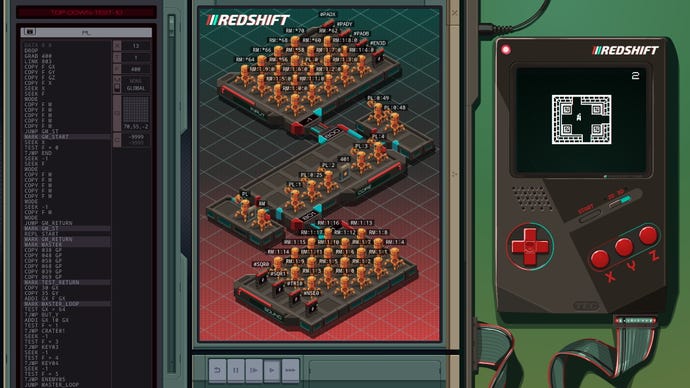
Exapunks is another of Zachtronics programming games. After so many puzzlers about tinkering with computer entrails, the studio finally made one themed around a 1990s vision of hackerdom. Chat rooms, zines, pizza deliveries, cybernetic plagues that turn your flesh into circuit board. It's all there, an accurate portrayal of the decade.
The puzzling is similar to other games from the studio, most notably Shenzhen I/O. You clack away at your keyboard, using keywords and commands to create a little screed of magical electricity. Here, you're programming tiny spiderbots who can replicate and spread inside the host machine, like a little virus. You can hack a bank's ATM machine and make it spit money into the street. You can hack a videogame console and share home-brewed games with other hackers in the real world. You can hack y0uR oWn ArM. It's a good videogame.
The developers interviewed some hackers to research the story of the game, designer Zach Barth told Alex Wiltshire. "It turns out that hackers are assholes," he said. "We interviewed a bunch and mostly they stole credit cards and figured out ways of ripping off phone companies to get free phone calls."
9. Gunpoint
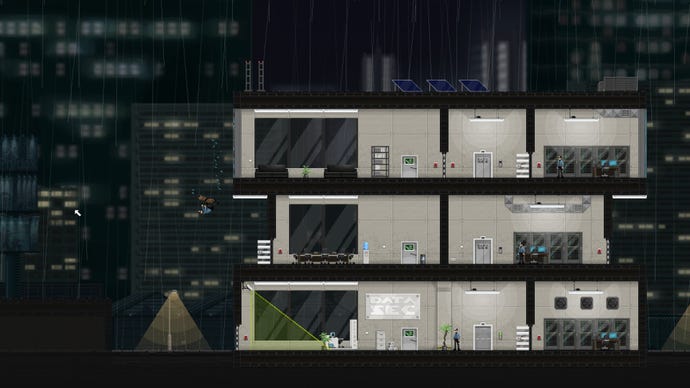
Pneumatic trousers have never been so inviting. In Gunpoint, your shady spy protagonist has to break into guarded buildings and steal data for his private clients. To do this, you're given the Crosslink, a device that lets you manipulate the wiring of each level. You are essentially a clandestine electrician with trousers that allow you to bound over buildings. You can rewire light switches to give guards electric shocks, toy with the elevator so it travels up and down, and (eventually) you can rewire firearms themselves. Because dystopia.
It isn't all messing with wires though. Gunpoint retains a love of wacky violence. You can slam open a door in a guards face, jump on them from the ceiling ninja style, or pounce on them from afar and take them plunging from the rooftops, only to smack them in the chops dozens of times after impact. I think this is called 'social engineering'.
Disclosure: Tom Francis, Gunpoint's developer, was and is an occasional RPS contributor.8. Midnight Protocol
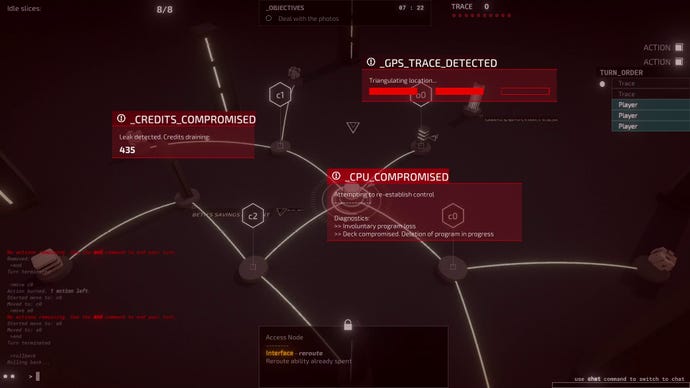
Midnight Protocol is a turned based strategy game that takes place on the battlefield of computer networks. You play as Data, a hacktivist who has been recently released by the cops after your identity was leaked. Violating the conditions of your release, you've gone right back to hacking networks and emailing your network of shady friends and peers, with the initial goal of figuring who unmasked you, why, and how they were even able to find out who you are in the first place.
Midnight Protocol is played entirely with your keyboard. As you get new addresses to hack into, either from investigating or passed to you by info brokers, you break into them with different goals. There are bank accounts that you can drain dry or leave, information to download and use as you wish, and you can place trojans and other traps to get what you need. You have a deck of five programs to run, like a cloak to slow down the tracing process that the enemy network will start as soon as you hop on board, aggressive attacks to breach firewalls and other defences, and scout programs to detect those defences in the first place. Each of these is deployed with typed commands, and you can buy more from the blackmarket as you make more money. The choice you make also affect your reputation as a grey, white or black hat hacker. It all starts off simple enough, but pretty soon you're juggling networks of nodes pushing double figures. As games to make you feel like a proper hacker go, this one is way up there.
7. Hackmud
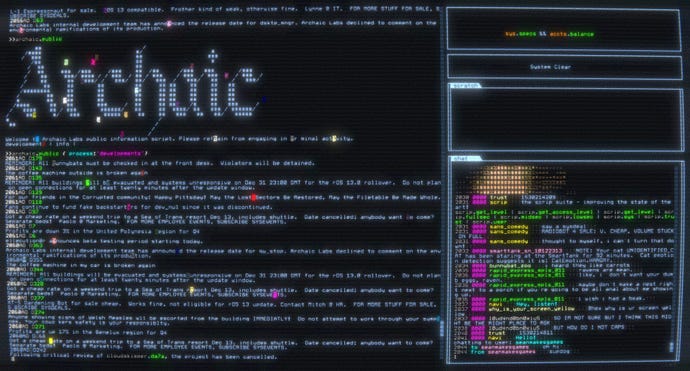
Hackmud is a terrible, wonderful place. You exist as an AI bot inside a connected future-world. It's been a long time since the humans died out (or disappeared to space, it's a bit ambiguous). As such, you must collect and earn GC, a virtual currency, because this is what scrappy constructs like yourself live for. Unfortunately, there are others. This is an online hacking game, where another player might break into your accounts, steal all your hard-earned digi-coins, strip you of your tools (little decryption programs and the like) and release your location for all to find. If this happens, you are for the scrap heap, little bot. Time to start again.
It's a difficult world to get into and you won't get the full benefit of it unless you either spend some time learning basic Javascript or already know the programming language. In MMO terms, it's akin to EVE Online. The stakes are high, the difficulty curve is obscene, and the universe is full of scam artists. I know, because I've been one of them. For these reasons, Hackmud isn't for everyone. But for those who do venture into this Petri dish of paranoid pondlife, it can be a crazy adventure.
6. Shenzhen I/O
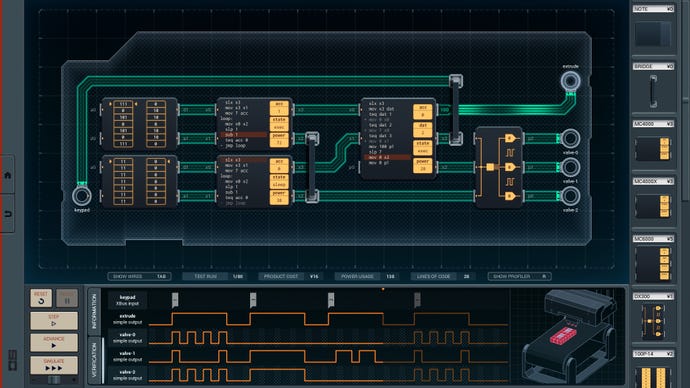
Another Zachtronics game? Well, if you're going to set your games inside the confines of a fictional operating system, why stop at one? Here, you're an expatriate living in industrial China, working for an electronics firm called Longteng. Email alerts ping and tasks are set. You've got to make devices for various clients. Sometimes this is as simple as a flickering neon advertisement. Sometimes it's a little more clandestine. In all cases, you're going to have to refer to the manual, which the game recommends you print out and put in a binder (I second this advice).
In many ways, it's the spiritual successor to TIS-100. You still tinker with numbers, nudging them from one node to another in basic programmer-speak, and you still try to optimise your designs to run more efficiently. But this time there are components to worry about. You move chips and switches and gizmos around on a circuit board. In more ways than one, you're trying not to get your wires crossed.
5. Quadrilateral Cowboy
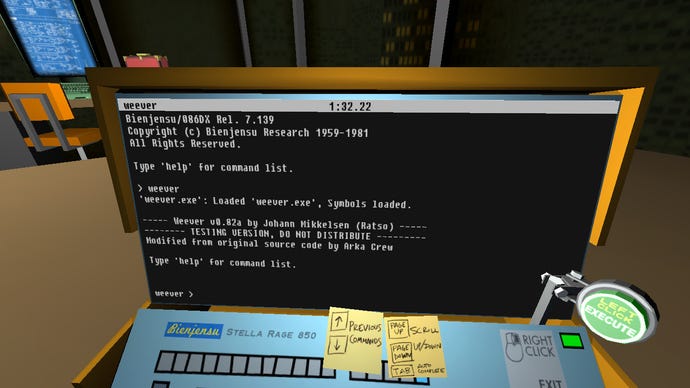
Brendon Chung has a clear love for heists and capers, as became clear when he decided to make something that lasted longer than a few minutes. Here, you're a team of thieves. While you do get to control a full trio of characters, you'll mostly be playing as the Hacker. Each level is a small environmental puzzle that needs to be solved by typing commands into your 'deck' - a computer-in-a-briefcase with a 56k modem that you bring along to each fancy apartment building, bank vault or space station (yes, you go to space). Commands are simple, for example, typing 'door4.open(3)' will open the door number 4 for 3 seconds. Using these methods you have to get into forbidden spaces, avoiding cameras, lasers and alarms, grab whatever you need, and get out.
It's not a perfect game but its vision of a retro-cyberpunk Nuevos Aires is detailed and stylish, all warning signs and jump cuts, while also containing some wordless yet oddly tender storytelling. Hacking games sometimes neglect the details of the real world, becoming ensconced in a single screen. Quadrilateral Cowboy reminds you that the computer is just a means to effect change in reality. It's also got a brilliant cat. Blendo made the game's code open source shortly after release
4. Duskers
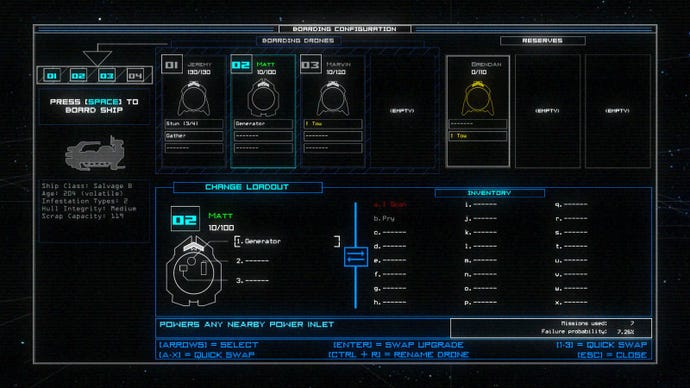
You know the opening scene in Aliens, where the little probe comes into Ripley's escape pod and scans down the room with a wobbly blue light? That's how Duskers feels. You control a squad of drones as you look for salvage among the stars. You need scrap and fuel to keep your ship going. To get this you must board and explore the derelicts littering the galaxy (for reasons not quite clear). Any other designer handed this premise would immediately think: 'Okay, so point and click control and maybe some hotkeys'. But not Misfits Attic. For this job, you will rely almost entirely on a command-line terminal.
It's a move that fits perfectly with the game's atmosphere and art style. The user interface is all about that clunky 1970s Nostromo-vision of the future, right down to the pause menu. Presented with a schematic of a ship, you type commands to move a drone to a power outlet and generate electricity. Then type more commands to open doors. Slowly you make your way through the wreckage, hoping that behind the next door there is no alien menace. This would be terrible news. Your robotic helpers are so fragile they may as well be made of phone screens.
A lot of hacking games are about panicking and typing fast under pressure. But Duskers is about being meticulous. Use motion scanners and sensors to detect harmful bioforms. Flush aliens out of the ship by remotely opening airlocks, or luring them towards turrets. It's made more tense by the roguelike structure and the FTL-like fuel consumption.
3. Uplink

This is the game that often comes to mind when someone says "hacking sim". When Introversion came up with Uplink they pretty much redefined what a good cyberpunk PC game should look and feel like. Playing under your own alias on a computer-within-a-computer, you join an agency of hackers-for-hire. You soon begin breaking into networks to alter records, steal data and delete unwanted files. Along the way you discover more programs and upgrade your rig to break into stronger, scarier systems. You also have to bounce your connection all around the world through multiple IP addresses. This tapped into the theatrical conception of hacking at the time - the scene from Goldeneye were Natalya traces Boris' connection, the digital heist of Swordfish (which we keep mentioning because it's a cultural touchstone).
No such oral in Uplink though. The game was harsh about failure and would often see your proxy machine and bank account impounded by The Law, leaving you to start all over again. You could 'save' your game by tweaking the game files themselves, which could be interpreted as a cool meta puzzle. It's a little dated now, so you'll want to play with the Uplink makeover mod installed. Apart from that, Uplink easily became a cult classic and paved the way for all those following in its wake. Certainly, the next game on this list may never have existed without it.
2. Hacknet
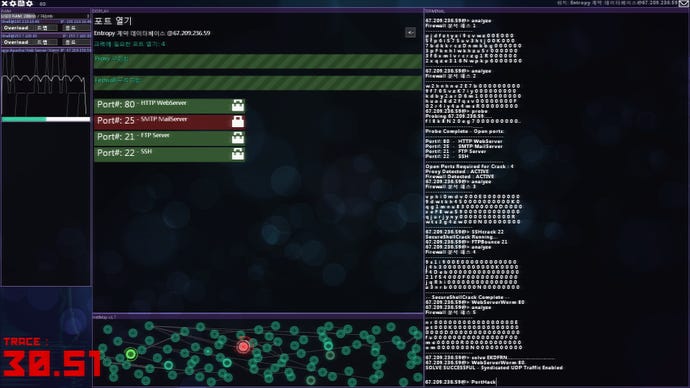
Hacknet was slightly overlooked. Like Uplink, it puts you in the role of a computer user trawling through IP addresses, mingling with underground hacker communities. An unknown benefactor known as 'Bit' has granted you this strange new OS, basically a hacker's toolkit. But don't worry about him because he's dead. The real joy of the game comes not from figuring out his death or the origins of the OS (although that's a decent hook), but from using the command-line to run programs, explore the directories of your targets and generally cause a big ruckus. Bonus immersion if you listen to the WipeOut soundtrack while you do it.
There's an element of mouse control (you can select files by clicking them for instance, rather than typing the whole thing out) but the further you delve into this new realm the more speed you need to become untraceable. You begin to use the terminal in earnest, the Linux-style commands becoming second nature. There is a great moment in the early stages involving a rival blackhat hacker and some moral decisions to make you squirm. Not to mention an entirely separate storyline for the more criminally minded. Like I say, the idea itself owes a lot to Uplink. But it's the execution that makes Hacknet great. A few misspelled words and a bug or two can't stop it from being stylish, funny, and gracefully short. If your computer has a CD drive, typing 'openCDTray' into the terminal in Hacknet will make your CD tray actually open up.
1. else Heart.Break()
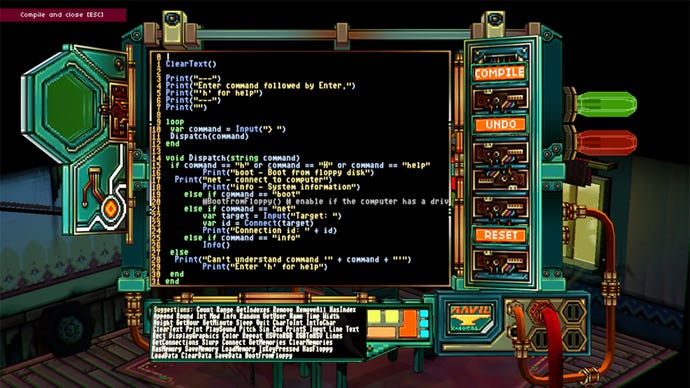
When you start playing this colourful Scandi adventure, you might be forgiven for thinking it's a slow, ponderous point 'n' click with absolutely no direction. But persevere and you'll find one of the smartest games you'll ever play. Heart.Break() puts you in the bright green shoes of Sebastian, who has moved to the big city of Dorisburg after landing the job of a soda salesman. You saunter around this strange city selling can after can to cranky citizens, most of whom don't even want one. As you start out in this brave new world of refreshment, you'll meet some a group of hacktivists fighting against the monstrous Computer Ministry. Soon you get your own 'modifier' - a device that lets you hack any usable object in the game.
At this point, Heart.Break() flips. You go around exploring the code of everything you can get your hands on. You find people who can teach you how to read and write in this code - a fully-fledged programming language called SPRAK (the Swedish word for "language"). You start to play and mess with everyday objects in ways that help you to cheat the game. For example, Sebastian normally gets tired every day and you have to go to bed to recharge your energy, otherwise you collapse. But what if you hack a glass of water so it reduces your "sleepiness" by a factor of "100"? Small things like this are just the start. Want to hack a door so that it takes you halfway across the city? Figure it out. Want to transfer your body over the internet to the city's central finance computer? You can do that. Want to rewrite the software of said finance computer so that everyone's bank account is reduced to $0 and money itself is abolished, a la Tyler Durden? Do it. I did. And I do not regret a single line of code.
